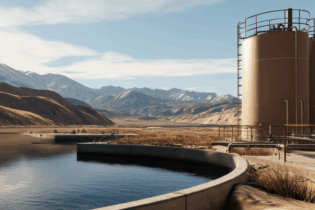Written by: Timony Siebert MPhil Marine Ecology (UCT)
Sustainability consultant, Talbot & Talbot
Water is the world’s most
critical resource. It sustains life, and thus the global food chain. It powers industrial production, and thus the global economy. Freshwater is perhaps the most important natural resource for human survival. But, it is also highly limited and currently under severe stress.
Less than 1% of the world’s water is readily available for direct human use and for the goods and services that sustain us in our daily lives. According to United Nations agencies, one-third of the world’s population live in countries that are experiencing moderate to high water stress. More than one billion of these do not have access to clean freshwater. Three billion do not have adequate sanitation services and the annual death toll from water-borne diseases is estimated at more than three million. Furthermore, pollution and the effects of climate change are creating additional pressures that are rapidly impacting on what little freshwater supplies we have left. We are now witnessing one of the world’s most significant and underreported public health, development and economic challenges – water insecurity.
The situation for South African’s is no less dire. South Africa is a water stressed country, increasingly dependent on water sources outside our borders. We have a legacy of mining and industry driven pollution, combined with aging water treatment and distribution infrastructure. A conservative estimate tells us that demand for water will exceed available supply by 2025. More recent statistics project that South Africa is likely to experience a 17% gap between water demand and supply by 2030, equating to a water shortfall of 2.7 billion m
3. With an emerging economy and a rapidly growing population (and consequent standard of living) that will place tremendous stress on resource needs, critical challenges lie ahead for managing our finite local freshwater resources and ecosystems. Not only do ecosystems rely on water for optimal health, but they offer valuable ecosystem services by enhancing water provision and purification and providing adaptive capacity to climatic changes.
In recognition of this, South African’s across the country have been gearing up to celebrate National Water Week (18 – 24 March 2013), ahead of
World Water Day on 22 March 2013. Under the theme
‘Water is life- Conserve it, Respect it, Enjoy it’, this annual campaign aims to raise awareness about the role of water in social and economic development and encourage citizens to take ownership of natural water resources by becoming more conscious users. The campaign emphasises the importance of water conservation as a key intervention towards securing future water supplies for the country and hopes to highlight the centrality of water as a resource for the well being and functioning of both the environment and its people. But despite this critical role and its growing scarcity, water continues to be undervalued in society, and is often incorrectly thought of as being ‘free’.
South African’s therefore need to stand up and take collective responsibility of our water use and learn to become more water efficient. Through our choices and actions we can significantly impact how water resources are used and allocated, and help to influence whether or not our resources are being sustainably managed. More than that, as a country, we need to invest in technology and behavioural change to either reduce the demands placed on our limited water supplies or implement strategies to recycle and re-use our water. In this way we can help create alternative sources of this precious resource to replenish natural ecosystems and supply local communities.
Fortunately, many individuals, groups and businesses are responding to this water challenge and are working together to try reduce the pressure on water resources, and encourage sustainable water stewardship. Whether water is a core ingredient or plays a supporting role in producing a final product, it is vital to the operation and growth of almost every business. So when water is scarce, not replenished at the same rate it is used, or otherwise inaccessible due to pollution or quality issues, the effects of local water scarcity have ramifications on a much larger scale.
Specialist companies such as Talbot & Talbot are embracing this challenge and partnering with leading corporations in exploring alternatives to ensure more efficient and sustainable (re)use of water where possible. By properly accounting for water use and wastewater discharge, companies can identify obstacles, risk areas and potential solutions for improving water use and even take steps towards replenishing the water used in the production of their products. When seen against a backdrop of a projected national water crisis, the case for urgent action is compelling.
Solving the water crisis in its many aspects may be one of the biggest challenges facing humankind in this third millennium, and one that is too large for any one sector to tackle alone. But collaborative efforts and management initiatives between public and private groups (businesses, government regulators, policy makers, NGO’s, local communities) that continue to fuel new investment into water stewardship will go a long way towards delivering change and helping to secure and sustainably manage South Africa’s precious water resource.






